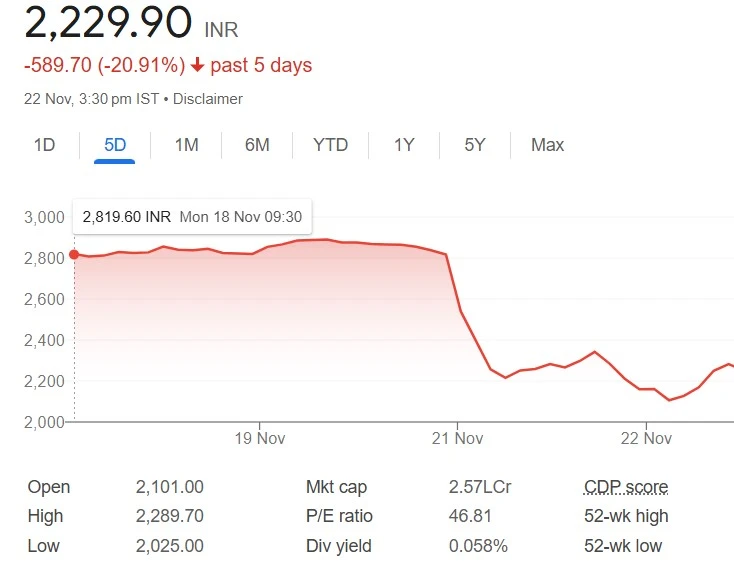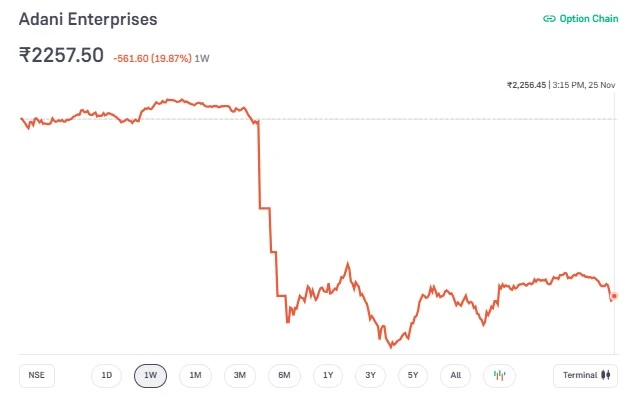
Search Assignments
Our Experts

Search Assignments

Customers Reviews
At the helm, rules are mere spectators to transition. The people who run the show are possessed with the power of wealth, and to them, it is the only option. And why wouldn't it be? It's the 2nd god which acts as the supreme power that can open any closed door that requires to be pushed open.
Wealth defies all logic that we have been taught; the consequences can be altered, and laws are mere textbook references. It doesn't matter if it's getting government contracts, forging documents or dealing with legal issues. The Wealthy can drive anything.
Take Gautam Adani as an example, with a wealth that ranks him as the 2nd wealthiest individual in Asia and the 25th-richest worldwide. Adani's operation is based on the notion that wealth is a solution to every problem. From his perspective, it's hard to deny that.
Recently, on November 21st, 2024, the US Prosecutors accused Adani of orchestrating a vast corruption scheme to obtain a solar power contract in India.
Similar stories surround Anil Ambani. He, too, was caught up in controversy recently over the submission of fake documents in bids on a solar energy plant in India.
However, the end is still going to be driven by the power of money. The results and reasons will be tweaked and twisted, and the reality will be in oblivion. No one will try to end these occurrences as an example for others, but such cases will become case studies for overcoming such hurdles.
This article will examine recent allegations that surround the Indian solar power plants, the government purchase and its distribution. It also outlines the urgent need of our governments to move beyond punishing billionaires who appear to have no concern for the effects. The current scenario calls for more stringent rules, not apologies.
According to US Justice Department, the Adani Group has been accused of paying $265 million of US investor's money to Indian officials for the 12 GW solar power projects- a deal that could potentially yield $2 billion in 20 years.
The US DOJ has issued an arrest warrant against Adani group. The allegations are more severe than Adani's previous scandal of the Hindenburg report but are based on similar grounds. The latest reports although state that Adani and his family, including his nephew have not been mentioned in the bribery charges, but nevertheless, the allegations against Adani employees still remain.
In 2023, the Hindenburg research report exposed the irregularities within Adani's financial practices. The report raised concerns over stock manipulation and overleveraging, concerns which have been proven true through the DOJ's investigation.
The timing couldn't be worse for the Adani group, as just a few days ago, Reliance Energy faced a similar blow. Reliance Energy was banned from participating in auctions for submitting fake documents to secure a tender for a solar power project in India.
The saga began in 2021 when Adani’s firm raised $3 billion through loans and bonds. Out of the raised sum of $3 billion, $175 million was raised from American investors, who were promised the firm's anti-corruption and anti-bribery practices.
As per US officials, the statements have been false and misleading for US investors. They alleged Adani and seven associates, including his nephew, of conspiring to bribe Indian officials in 2020 to help win the solar energy project to build solar plants.
The investigation into Adani’s activities became public in March 2023, when a special FBI agent approached his nephew with information about the ongoing probe. Following a search warrant and the seizure of electronic devices, the DOJ found clear evidence of violations of the Foreign Corrupt Practices Act, securities fraud, and more.
In December 2019, the Solar Energy Corporation of India (SECI) awarded contracts to the Adani Group and Azure Power under a manufacturing-linked solar tender. The project involved the generation of 12,000 megawatts (MW) of solar energy, with Adani tasked to supply 8 GW and Azure Power 4 GW. The contracts were one-of-a-kind arrangement. The Adani group even claimed it as "the world's largest solar award" worth approximately $6 billion. The deal was expected to yield $2 Billion in two decades.
However, the prices of solar electricity supplied by Adani and Azure to SECI were high. SECI failed to secure customers for the produced energy as governmental electricity distribution companies, found the rates unpalatable, leading to substantial delays in signing Power Purchase Agreements (PPAs).
Faced with stalled projects and the threat of losing lucrative contracts, U.S. prosecutors allege that between late 2019 and mid-2020, Adani and his associates devised a bribery scheme, pledging an enormous sum—reports vary between $265 million to $250 million—to Indian government officials to ensure that state discoms entered into Power Supply Agreements (PSAs) with SECI. The operation purportedly involved payments to multiple state officials across various regions, notably in Andhra Pradesh.
The indictment further claimed that Gautam Adani had multiple meetings with these officials. The details from the indictment stipulate that significant bribes were specifically directed towards obtaining agreements from state governments, with around ₹1,750 crore (approximately $250 million) earmarked for Andhra Pradesh alone.
The turning point in the scrutiny of Gautam Adani's business practices arrived in January 2023 when Hindenburg Research, a U.S.-based investment firm, released a report accusing Adani Group of extensive stock manipulation and accounting fraud spanning decades. The report outlined how the group had allegedly utilized a network of offshore companies to manipulate stock prices and inflate revenue claims.
Following the Hindenburg report, which asserted that the Adani Group had significant undisclosed debts, the conglomerate’s share prices plummeted dramatically—some companies saw declines of up to 83%, which wiped billions off the group's market capitalization.
The latest wave of allegations culminated in November 2024 when U.S. prosecutors formally indicted Gautam Adani, his nephew Sagar Adani, and several others on charges of conspiracy to commit bribery and fraud related to securing renewable energy contracts.
Recent statements from the Adani Group have vehemently denied the bribery claims, emphasizing that the charges are unfounded and characterizing the indictment as a product of hearsay and assumptions. The group has reiterated its commitment to complying with all laws and has vowed to seek all possible legal recourse to defend its interests.
Political ramifications of these allegations are also significant, with opposition parties in India leveraging the situation to criticize the government of Prime Minister Narendra Modi for allegedly shielding Adani due to their close ties. The ongoing protests and demands for a formal inquiry into Adani's dealings reflect the broader controversy surrounding corporate governance in India's rapidly expanding economy.
After Adani’s bribery scheme got busted by the US DOJ, Adani’s business got momentarily hit. The investors backed off their investments in the Adani group. Australian investors have denied investment in Adani’s business over claims of ‘uncertainty’. Kenya's government cancelled a $2.5 billion project for building an airport and other infrastructure. Bangladesh's high court has asked the Adani group to reduce the price of electricity by threatening his investment there. Adani himself cancelled the $600 million bond issue from fundraising, which he planned to acquire through other investors.
After experiencing substantial declines due to severe allegations of bribery against the Adani Group, the stocks have rallied as investors reacted to a broader market recovery.
Initially, Adani Enterprises shares fell 24 per cent to an intraday low of 2,155 after hitting a series of lower circuits. It ended at Rs 2,184, down 23 per cent on November 21st (refer to image)
Adani stock price on November 22nd, 2024

Source: Google’s knowledge graph
However, the stock prices are on the rise again. As of November 25th, the stock price of Adani closed at 2257.50, compared to 2229.90 on November 22nd. (Refer image)
Adani stock price on November 25th, 2024

Image source: www.groww.in
The surge in Adani stocks is also tied to political developments, particularly the recent electoral success of the BJP-led Mahayuti alliance in Maharashtra state assembly elections. The political victory has filled investors with optimism, who believe that stability might positively impact the business environment for conglomerates like Adani.
Market analysts also suggest substantial grounds for Gautam Adani and his firm to fight against the allegations. Hence, the analysts are suggesting that the situation will momentarily affect the business and the long-term stock performance is expected to maintain steady growth.
In terms of prospects, Adani group has laid out ambitious plans to invest INR 8 Lakh Crore (USD 100 Billion) across its portfolio companies in the coming decade. Maintaining momentum in these sectors will also be critical to determine the long-term credibility of the business.
The recent events highlight the concerning perception of billionaires operating within India's energy sector. The lack of severe repercussions for high-profile corporate wrongdoing puts in question the effectiveness of India's regulatory and legal frameworks.
While measures have been implemented to ensure transparency in bidding projects, India must take decisive action against corporate malfeasance.
The world is watching, and India's green energy future is at stake.
The lack of severe legal repercussions raises a troubling question about accountability in the business world. Fines, a typical repercussion for the corporate giants, are nothing more than the price of doing business—mere expenses in their vast budgets. This strengthens the notion that the rich and powerful can bypass the consequences that would severely affect others.




No Comments